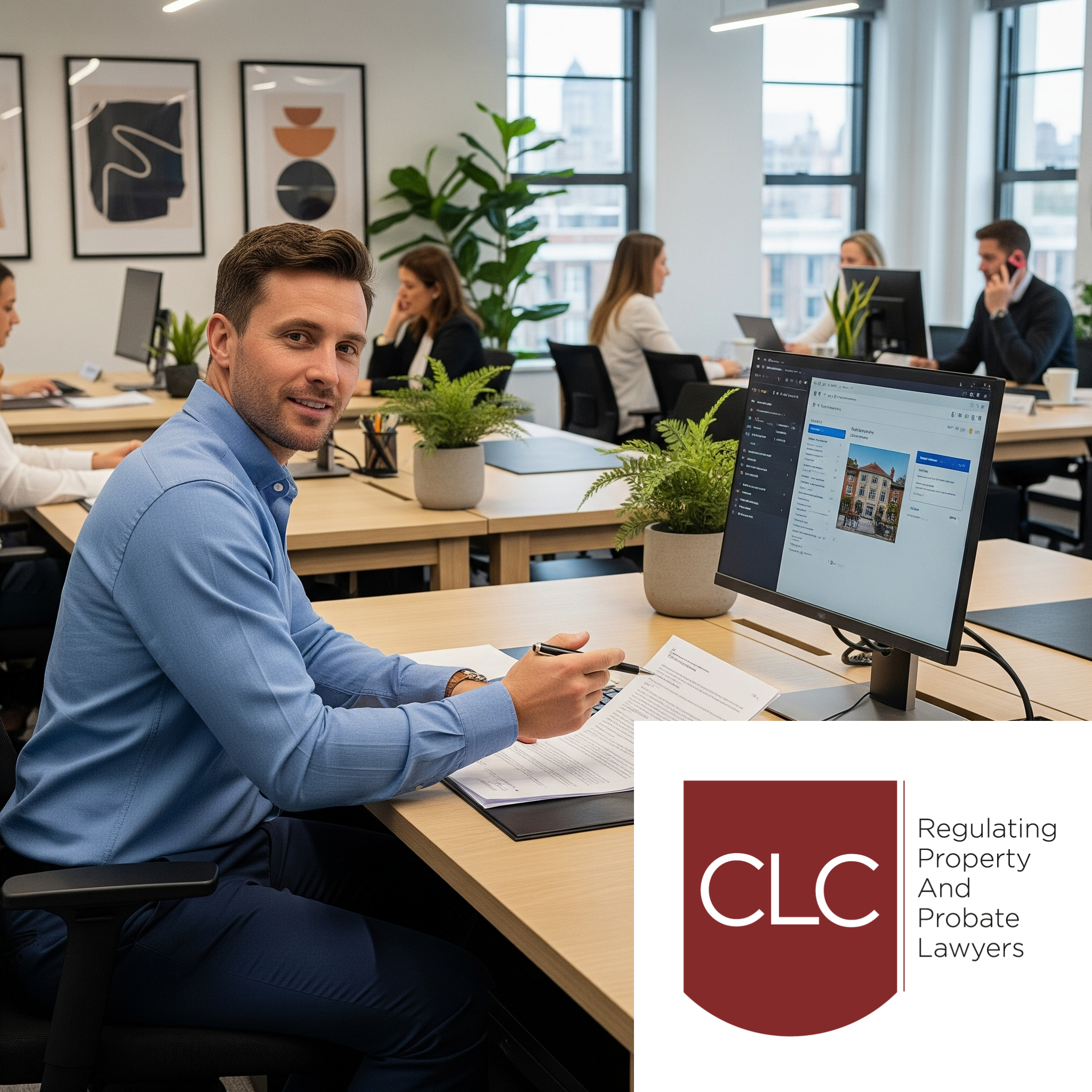Different Routes to Becoming a Qualified Conveyancer
Conveyancing is a vital part of the UK's bustling property market, involving the legal transfer of property ownership. As specialists in this field, we understand the importance of choosing the right qualification to ensure you become a skilled and sought-after professional.
Published: 04 May 2025
In England and Wales, there are three primary routes to becoming a qualified professional who can undertake conveyancing:
- Licensed Conveyancer (CLC Route): This specialist path, regulated by the Council for Licensed Conveyancers (CLC), focuses exclusively on property law. It's often the quickest and most direct route for those passionate about conveyancing.
- Solicitor: Solicitors undertake broader legal training, covering various areas of law, including property. They are regulated by the Solicitors Regulation Authority (SRA).
- Chartered Legal Executive (CILEx): Legal Executives are qualified lawyers specialising in a particular area of law, such as conveyancing. They are regulated by CILEx Regulation.

Licensed Conveyancer vs. Conveyancing Solicitor vs. Chartered Legal Executive: What's the Difference?
While all three professionals can handle conveyancing, their training and scope of practice differ:
- Licensed Conveyancer: These are highly specialised property lawyers. Their CLC Conveyancing Diplomas (Level 4 and Level 6) provide an in-depth focus on all aspects of property transactions. They can manage entire caseloads, advise clients, and handle all legal aspects of buying, selling, and remortgaging property. Importantly, they are able to open and run their own conveyancing firms
- Conveyancing Solicitor: A solicitor undertaking conveyancing will have completed a broader legal education (typically a law degree and the Solicitors Qualifying Examination (SQE) or the Legal Practice Course (LPC)). While highly competent in property law, their initial training covers a wider range of legal disciplines.
- Chartered Legal Executive: A Chartered Legal Executive will have completed CILEx qualifications and gained significant practical experience. They can specialise in conveyancing and carry out similar work to solicitors, often under supervision, though some may achieve independent practice rights.
The key distinction lies in specialisation versus generalisation. If your ambition is solely rooted in property law, the CLC Conveyancing Diplomas offer a focused and efficient path to becoming an expert.
1. The Licensed Conveyancer Route (CLC)
This is the specialist's choice, designed for those committed to a career purely focused on property law.
Qualifications Needed:
- Level 4 Diploma in Conveyancing Law and Practice: This foundational CLC Conveyancing Diploma covers essential legal principles, conveyancing procedures, and legal accounting.
- Level 6 Diploma in Conveyancing Law and Practice: This advanced diploma builds on the Level 4, delving into more complex property law, landlord and tenant issues, and managing client accounts.
Accelerated Qualification & Time Taken:
- Academic Study: You can typically complete both CLC Conveyancing Diplomas in 18-24 months of dedicated study, especially with flexible distance learning options provided by Access Law.
- Prior Learning Exemptions: A significant advantage of the CLC route is the ability to fast-track your studies if you have prior legal qualifications. If you hold a Law Degree (LLB or GDL), LPC, SQE passes, or relevant CILEx qualifications, you may be exempt from certain units or even entire levels of the CLC Diplomas, significantly reducing your study time and costs.
- Knowledge Mapping Tool: Further expedite your learning with our innovative Knowledge Mapping Tool. This assessment tool helps identify your existing knowledge and areas where you are already proficient, allowing you to skip parts of the programme you already know. This ensures your study time is highly efficient and focused on your individual learning needs.
- Practical Experience: A minimum of 1,200 hours of supervised practical experience in a conveyancing environment is required, which can be gained concurrently with your studies over 24 months.
- Total Time: Many individuals can qualify and be ready to practice as a Licensed Conveyancer within 2.5 to 4 years.
Costs Involved (Estimates):
- Course Fees for Diplomas: Approximately £4,230 for both Level 4 and Level 6 Conveyancing Diplomas (e.g., around £2,310 for Level 4 and £1,920 for Level 6 from some providers). These costs can be further reduced through exemptions. This is highly competitive compared to other legal qualifications.
- Licensing Fees: Additional fees apply when applying for your first license with the CLC.
Who Regulates Them:
- The Council for Licensed Conveyancers (CLC). The CLC is a specialist regulator dedicated to property law, ensuring high standards and consumer protection specifically within the conveyancing sector.
Salary Expectations:
- Entry-level/Trainee: £20,000 - £25,000
- Newly Qualified Licensed Conveyancer: £25,000 - £37,500+
- Experienced Licensed Conveyancer (5+ years): £45,000 - £65,000+. Top conveyancers, particularly those in senior roles or managing their own practices, can earn significantly more.
Career Progression:
- Exceptional. Upon qualification, you can manage complex property transactions independently. Progress to senior conveyancer, team leader, or head of department. A major advantage of the CLC route is the ability to establish and run your own conveyancing firm, offering complete autonomy and direct control over your earning potential. You can also specialise in areas like commercial conveyancing, new builds, or probate.
Level 4 Diploma in Conveyancing Law & Practice
Level 6 Diploma in Conveyancing Law & Practice
2. The Solicitor Route
Qualifications Needed:
The solicitor pathway offers a broader legal education, allowing for specialisation in various fields, including conveyancing.
- Law Degree (LLB): A 3-year undergraduate degree, or a non-law degree followed by a Graduate Diploma in Law (GDL, typically 1 year).
- Solicitors Qualifying Examination (SQE): This new assessment pathway requires candidates to pass SQE1 (functional legal knowledge) and SQE2 (practical legal skills). Preparation courses for SQE are typically undertaken.
- Qualifying Work Experience (QWE): A minimum of 2 years of full-time (or equivalent part-time) legal work experience, which can be gained in up to four different organisations.
- (For those who started before September 2021, the Legal Practice Course (LPC) and a 2-year training contract were the traditional route).
Time Taken:
- Academic Study: 3 years (LLB) + 1 year (GDL if applicable) + SQE prep (variable)
- Practical Experience: 2 years QWE.
- Total Time: Typically 5-6 years from starting a law degree to full qualification.
Costs Involved (Estimates):
- Law Degree: £27,750+ for tuition fees (plus living costs).
- SQE Exam Fees: Approximately £4,790 (£1,888 for SQE1, £2,902 for SQE2).
- SQE Prep Courses: £3,000 - £8,000+.
- Total Estimated Cost: £45,000 - £60,000+ for academic qualifications and exam fees, excluding living costs.
Who Regulates Them:
- The Solicitors Regulation Authority (SRA).
Salary Expectations:
- Trainee Solicitor: £20,000 - £35,000 (can be higher in large commercial firms).
- Newly Qualified Solicitor (Conveyancing): £30,000 - £50,000+ (highly variable by firm type and location).
- Experienced Solicitor (Conveyancing): £45,000 - £80,000+, with partners earning significantly more.
Career Progression:
- Broad progression across various legal fields or specialisation. Within conveyancing, progression mirrors that of a Licensed Conveyancer: senior solicitor, partner, head of department, or even setting up your own SRA-regulated firm.
Level 4 Diploma in Conveyancing Law & Practice
Level 6 Diploma in Conveyancing Law & Practice
3. The Chartered Legal Executive Route (CILEx)
This flexible route allows individuals to specialise in an area of law, often while working, making it a popular choice for those already in legal support roles.
Qualifications Needed:
- CILEx Professional Qualification (CPQ): This is typically broken down into three stages: Foundation, Advanced, and Professional. Each stage involves academic study and assessments.
Time Taken:
- Academic Study: Can be undertaken part-time alongside work. The entire CPQ can take around 5 years of part-time study.
- Practical Experience: A minimum of 2,300 hours of qualifying legal experience, including two years in the chosen specialism.
- Total Time: Often around 5-6 years to fully qualify.
Costs Involved (Estimates):
- CPQ Course Fees: Can range from £2,000 - £4,000 per stage, totaling perhaps £6,000 - £12,000 for the full qualification, often less than the solicitor route.
- Membership & Assessment Fees: Additional costs apply.
Who Regulates Them:
- CILEx Regulation.
Salary Expectations:
- Entry-level/Trainee: £18,000 - £22,000
- Newly Qualified Chartered Legal Executive: £28,000 - £40,000
- Experienced Chartered Legal Executive (Conveyancing): £40,000 - £60,000+.
Career Progression:
- Progression to senior legal executive, associate, or even partner in some firms. Chartered Legal Executives can also apply for rights of audience and some independent practice rights, similar to solicitors, though the focus of their initial training is narrower.
Why Choose the CLC Conveyancing Diploma Route
For those who know their passion lies firmly in property law, the CLC Conveyancing Diplomas offer a compelling proposition:
- Specialised Expertise: Unlike the broader scope of solicitor or legal executive qualifications, our CLC Conveyancing Diplomas focus solely on property law, ensuring you become a true expert in the field from day one.
- Faster & More Direct Qualification: The CLC route is demonstrably quicker and more streamlined for aspiring conveyancers, getting you into practice sooner.
- Cost-Effective Investment: Our conveyancing courses leading to the CLC Diplomas represent a significantly more affordable investment compared to the substantial fees associated with many solicitor routes.
- Equal Standing and Opportunities: Crucially, a Licensed Conveyancer holds equal professional standing, salary potential, and career progression opportunities in property law as a solicitor specialising in conveyancing. You're not a "lesser" professional; you're a specialised one. The ability to open your own CLC-regulated firm provides an unparalleled level of entrepreneurial freedom.
- Strong Regulatory Oversight: The CLC's dedicated regulation ensures that Licensed Conveyancers adhere to the highest standards, building public trust and professional integrity.
- Versatile Employment: Licensed Conveyancers are highly sought after in diverse environments, including:
- Traditional law firms
- Specialist conveyancing practices
- Housing associations
- Local authorities
- Banks and building societies
- Property development companies
At Access Law, we are an approved training provider for the Level 4 & Level 6 CLC Conveyancing Diplomas. Our expertly designed courses offer flexible learning options, including comprehensive distance learning, to fit your lifestyle. We provide the support and resources you need to achieve these prestigious qualifications and launch a successful career as a Licensed Conveyancer.
Don't just qualify; specialise and excel. Explore our CLC Conveyancing Diplomas and take the most direct path to becoming an in-demand property law professional.
Level 4 Diploma in Conveyancing Law & Practice
Level 6 Diploma in Conveyancing Law & Practice
More related posts

Funding: Your Complete Guide to Grants, Loans & Sponsorship

Conveyancing Qualification: How Long Does it Take?











